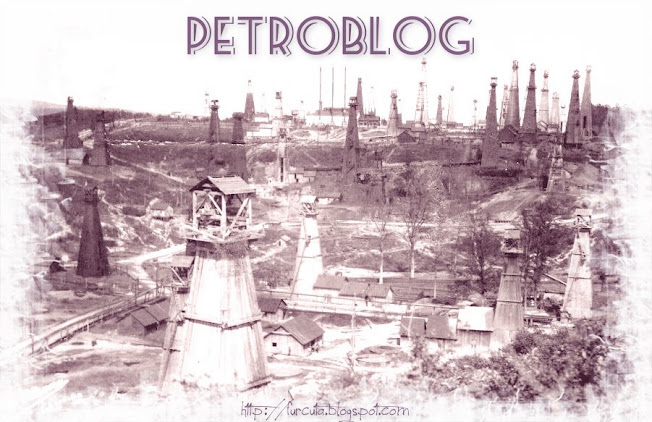The hand-dug wells in Roumania are highly interesting relics of a period which is now relegated to the past, though so long as the Roumanian petroleum industry exists, so long will the old hand-dug wells be associated with it. These wells are about 5 feet in diameter, and are sunk through alternate layers of clay, schisty clay, sandy clay, sandstone, and petroliferous sand to the more shallow oil horizons. They are dug by workmen who descend dressed with the minimum of clothing, usually saturated with oil, and wearing a tin hat to protect the head from falling stones, etc. The sides of the wells are lined with impermeable clay, which is protected by wicker-work. The man is lowered by a rope, air being supplied to him by means of bellows. At some places the rotary fan was employed more recently, but somehow it frequently happened that it was operated in the wrong direction, and the unfortunate digger was asphyxiated. These old wells have a depth of about 450 feet, and though their yield of oil is not considerable, it has for many years been a paying proposition to those engaged in this primitive method of petroleum production. The excavated earth, when digging these wells, was brought to the surface in buckets, lowered and raised by means of either manual labour or horse traction. When the first oil source, was reached and the extraction of the crude oil com- menced, this was accomplished by means of the use of wooden buckets or leather skins, one being lowered empty while the other was raised full. By this means it was possible to raise as much as 20 tons of the oil per day quite a considerable amount, considering the primitive means adopted.
THESE AMAZING HD PICTURES FROM 1910 REFLECT THE BEGINING OF THE OIL INDUSTRY IN ROMANIA AND SHOW THE PIONEER OILMEN.
JUST CLICK ON EACH PICTURE AND ENJOY
THESE AMAZING HD PICTURES FROM 1910 REFLECT THE BEGINING OF THE OIL INDUSTRY IN ROMANIA AND SHOW THE PIONEER OILMEN.
JUST CLICK ON EACH PICTURE AND ENJOY
In 1895 was founded the Anonymous Society Steaua Romana, having both Romanian
and foreign capital. In 1897, after the Refinery has purchased all the oilfields surrounding Campina
city, it became a modern refinery. When operations have started, the refinery
was the most modern and the largest refinery in Europe. In 1904, a school of foremen, distillers and oil workers was opened in Campina,
the first of this kind in Europe. In the First World War Romania entered the war on the side of the Antanta
members. The entire petroleum sector was under the control of the war
administration. In November 1916, most of the refinery installations were
destroyed by Allies, not to fall into the enemy’s hands. Later, the oil wells
and the refinery have been urgently recovered by Germans. In 1917, Kaiser
Wilhelm the second and the Marshal Machesen visited Campina, well known for its
oil and refinery.The inter-war period is considered the glory period of Steaua Romana refinery,
during which installations were modernized, new equipment was bought, and a
record quantity of 1.4 million tons/year of crude oil was processed. In the Second World War and Romania entered the war on 22 June 1941. During the
Second World War, Steaua Romana refinery worked at full capacity and supplied
diesel oil, gas, oils and other derivates to the war front. On 1 August 1943,
the British and American squadrons bombed Steaua Romana refinery, destroying
the installations, the oil wells and leaving behind a real disaster. In 1944
(on 5-6 May, on 10 and 18 August), the refinery suffered other four air raids,
which made it non-functional. After the War, the refinery needs 4 years to recover. At nationalization, in 1948, the communist regime took over the refinery in
functional state, at a recovered capacity of about 500,000 tons/year. Almost half a century, Steaua Romana refinery, as well as the entire Romanian
economy, witnessed a period governed by the socialist principles of activity
division.
Steaua Romana refinery in still in function even today.
Steaua Romana refinery in still in function even today.










